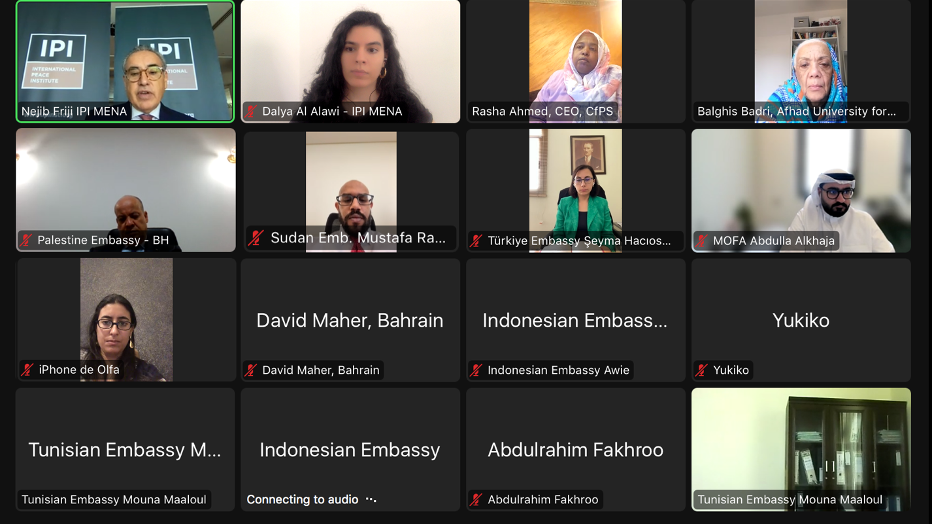
Diplomatic corps, private sector, representatives of civil society and key players called on international organizations, NGOs, and key stakeholders to work towards a peaceful resolution of the conflict in Sudan.
On June 11th, IPI MENA hosted a webinar under the theme “Women in Civil Society Mitigating the Conflict in Sudan” which featured Rasha Ahmed, CEO of Collaborative for Peace in Sudan (CfPS), and Balghis Badri, Director of Regional Institute for Gender Studies at the Afhad University for Women in Omdurman as speakers.
Opening the conference, IPI MENA Senior Director Nejib Friji underlined the current context in Sudan, citing the 1.2 million people internally displaced, and approximately 425,000 people seeking refuge in neighbouring countries.
“FAO and WFP have elevated Sudan to the highest alert level, where hunger is set to worsen as fighting is putting people at risk of starvation. They estimate that 2.5 million within Sudan are set to face acute hunger in the coming months because of movement restrictions affecting people and goods,” he stated.
He praised the Sudanese women as key civil society members, members of academia, and humanitarian agencies striving to mitigate the conflict. “We stand with the people of Sudan and remain committed to a peaceful solution and ceasefire to the conflict.”
IPI MENA Policy Analyst Dalya Al Alawi stressed that it is during the peace process that women’s inclusion must be taken into consideration. She highlighted the poor representation of women in peace-making processes despite women suffering disproportionately as a result of the conflict.
“Women are key in the food production chain and with current fighting, they can’t access the farms and agricultural inputs to produce food, leaving families and communities unable to get food,” she stressed. “Forty-two percent of households headed by women have less food compared to 31 percent of male-headed households. The lack of food has a direct impact on pregnant mothers as they are undernourished, contributing to an increase in malnutrition rates among children. According to UNICEF, Sudan has one of the highest rates of child malnutrition globally. More than three million children under five are malnourished.”
She emphasized that increased awareness of violence against women, growing support for women’s empowerment, and more understanding of the links between inclusivity and development offer a unique opportunity to accelerate action toward bringing more women into the mainstream of making and sustaining peace at all levels.
Rasha Ahmed pointed to the role women are playing in Sudan during the conflict, in organizing support networks in villages, providing aid to internally displaced peoples (IDPs), and particularly in finding space for internally displaced children in schools as education remains open in villages away from the fighting.
She stressed that strategic work must also be done in involving women in combating hate speech and disinformation. “It is a small point now but it builds coexistence between communities to maintain social fabrics,” she stated, emphasizing the long-term and sustainable importance of women as community builders.
Noting the key role women play in civil society, she emphasized the vitality of including women in negotiations. “We are not talking about ceasefires only, women should be included, and their gender perspectives that reflect sides that are normally ignored in negotiations. When I talk about women’s presence, I mean real presence that reflects real issues, concerns, and problems they face and not just quotas.”
Ms. Ahmed also underlined the significance of supervising, monitoring and evaluating political processes and the need for holistic approaches and training centres for women to develop these skills. “We need international support for the Sudan Conflict Observatory Remote Monitoring platform,” she stated. “This process could continue until the elections, as an investment for the long term to guarantee effective representations from civil society. This will give us an opportunity to avoid problems from the past.”
Pointing to the role of universities and education in addressing women’s rights and peace issues, Balghis Badri noted that universities are key components during the revolution due to their diversity. “There is the transactionality of class, age, profession, gender, labour, and disabilities. That is why they’re able to be part of the resistance revolutionary committees, political parties, and different civil society groups besides their own university unions.”
She reminded the audience of the initiatives women made during the revolution and the coup in 2021, to establish networks in support of women, and pointed to two main ones: ‘Al Harisaat’ and ‘حقنا كاملمابنجامل’ (We Are Going to Have All Our Rights). She underlined the draft commissions Afhad University women worked on; the constitution, land, electoral and women commissions to ensure that women are no longer marginalized. “Especially the issue of land rights, and the land commission, because women are usually marginalized in issues of land ownership although they are the main farmers in Sudan, specifically in West Sudan, inclusive of Darfur.”
Ms. Badri highlighted that women are currently working on issues of trauma counselling in the University centre, the 1325 action plan, making calls and appeals to various groups such as the Arab League, the African Union and the UN, as well as working in conjunction with collective groups with women in Egypt.
“There are those who are pregnant giving birth at the borders and elderly women who passed away while trying to cross the borders,” she stated. “We are asking how the UN agencies and different NGOs can help the Sudanese women, the young who have managed to cross and those who have stayed within the borders.”







